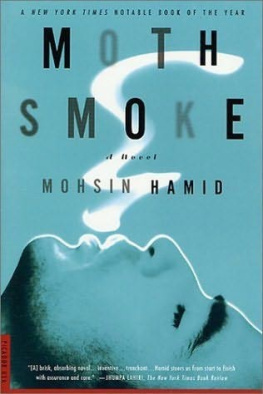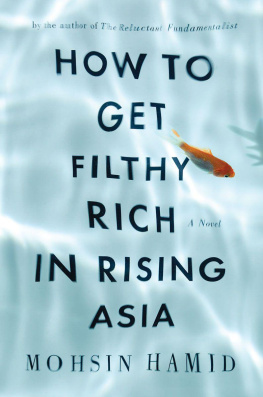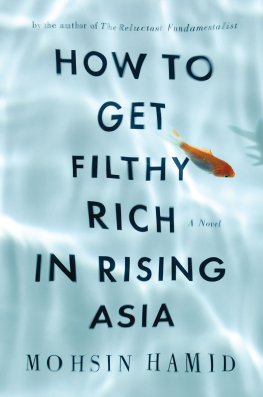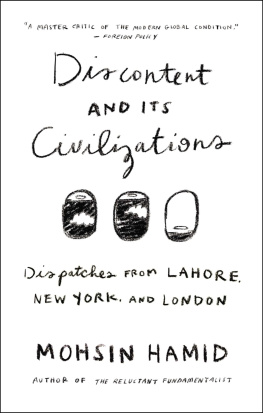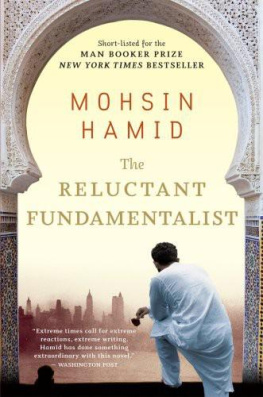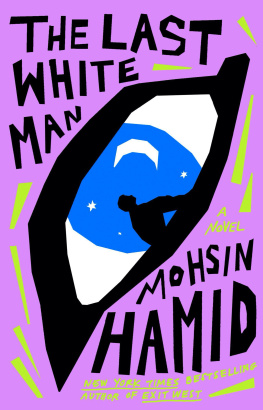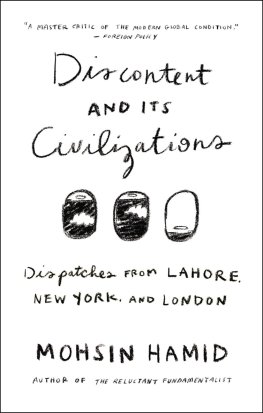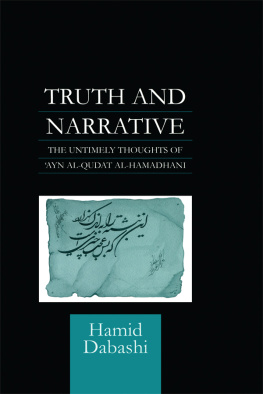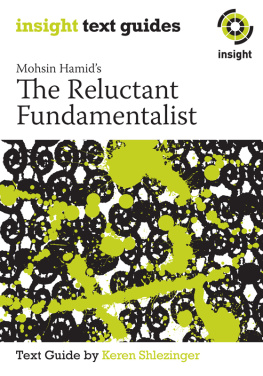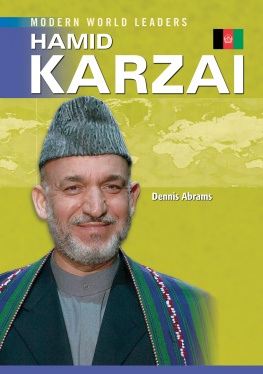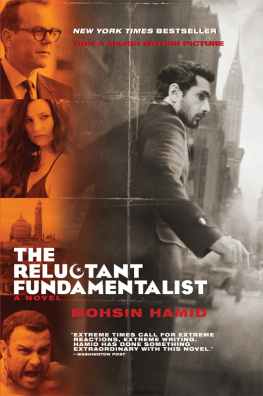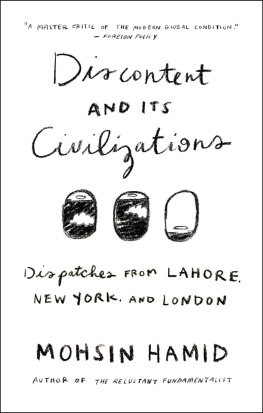ABOUT THE AUTHOR
Mohsin Hamid grew up in Lahore, attended Princeton University and Harvard Law School, and worked as a management consultant in New York and London. He is the author of two internationally bestselling novels translated into over twenty-five languages. The first, Moth Smoke , won a Betty Trask award, was a New York Times Notable Book of the Year, and was a finalist for the PEN/Hemingway award. The second, The Reluctant Fundamentalist , won several prizes including the Anisfield-Wolf Award and the Ambassador Book Award, and was shortlisted for many others including the Man Booker Prize, the James Tait Black Memorial Prize, and the International IMPAC Dublin Literary Award.
1
one
My cell is full of shadows. Hanging naked from a wire in the hall outside, a bulb casts light cut by rusted bars into thin strips that snake along the concrete floor and up the back wall. People like stains dissolve into the grayness.
I sit alone, the drying smell of a mans insides burning in my nostrils. Out of my imagination the footsteps of a guard approach, become real when a darkness silhouettes itself behind the bars and a shadow falls like blindness over the shadows in the cell. I hear the man who had been heaving scuttle into a corner, and then there is quiet.
The guard calls my name.
I hesitate before I rise to my feet and walk toward the bars, my back straight and chin up but my elbows tucked in close about the soft lower part of my rib cage. A hand slides out of the guards silhouette, offering me something, and I reach for it slowly, expecting it to be pulled back, surprised when it is not. I take hold of it, feeling the envelope smooth and sharp against my fingers. The guard walks away, pausing only to raise his hand and pluck delicately at the wire of the bulb, sending the light into an uneasy shivering. Someone curses, and I shut my eyes against the dizziness. When I open them again, the shadows are almost still and I can make out the grime on my fingers against the white of the envelope.
My name in the handwriting of a woman I know well.
I dont read it, not even when I notice the damp imprints my fingers begin to leave in the paper.
2
judgment (before intermission)
You sit behind a high desk, wearing a black robe and a white wig, tastefully powdered.
The cast begins to enter, filing into this chamber of dim tube lights and slow-turning ceiling fans. Murad Badshah, the partner in crime: remorselessly large, staggeringly, stutteringly eloquent. Aurangzeb, the best friend: righteously treacherous, impeccably dressed, unfairly sexy. And radiant, moth-burning Mumtaz: wife, mother, and lover. Three players in this trial of intimates, witnesses and liars all.
They are pursued by a pair of hawk-faced men dressed in black and white: both forbidding, both hungry, but one tall and slender, the other short and fat. Two reflections of the same soul in the cosmic house of mirrors, or uncanny coincidence? It is impossible to say. Their eyes flick about them, their lips silently voice oratories of power and emotion. To be human is to know them, to know what such beings are and must be: these two are lawyers.
A steady stream of commoners and nobles follows, their diversity the work of a skilled casting director. They take their places with a silent murmur, moving slowly, every hesitation well rehearsed. A brief but stylish crowd scene, and above it all you preside like the marble rider of some great equestrian statue.
Then a pause, a silence. All eyes turn to the door.
He enters. The accused: Darashikoh Shezad.
A hard man with shadowed eyes, manacled, cuffed, disheveled, proud, erect. A man capable of anything and afraid of nothing. Two guards accompany him, and yes, they are brutes, but they would offer scant reassurance if this man were not chained. He is the terrible almost-hero of a great story: powerful, tragic, and dangerous. He alone meets your eyes.
And then he is seated and it begins.
Your gavel falls like the hammer of God.
Perhaps a query ( Where did I get this thing? ) flashes through your mind before vanishing forever, like a firefly in the belly of a frog. But the die has been cast. There is no going back.
The case is announced.
The prosecutor rises to his feet, and his opening remarks reek of closure.
Milord, he says (and he means you), the court has before it today a case no less clear than the task of the executioner. The accused has stretched out his neck beneath the heavy blade of justice, and there is no question but that this blade must fall. For he has blood on his hands, Milord. Young blood. The blood of a child. He killed not out of anger, not out of scheme or plan or design. He killed as a serpent kills that which it does not intend to eat: he killed out of indifference. He killed because his nature is to kill, because the death of a child has no meaning for him.
There can be no doubt here, Milord; no more facts exist to be found. The balancing of scales awaits, Milord; redress for wrong is come. Tender humanity screams in fear, confronted by such a monster, and conscience weeps with rage. The law licks its lips at the prospect of punishing such a one, and justice can shut its eyes today, so easy is its task.
The prosecutor pauses, his words leaping about the courtroom like shadows cast by unsheathed knives in the flickering light of some dying candle.
For this, Milord, is his crime
3
two
Steadying the steering wheel with my knees, I pull the last unbroken cigarette out of a battered pack of Flakes. There are trees by the side of the road, but only on one side, and its the wrong side, so their shadows run away from me in long smiles that jump over boundary walls and grin at each other while I bake in my car like a snail on hot asphalt.
Knees turn the wheel left, then right, steering around an ambitious pothole, a crack aspiring to canyonhood. Fingers twist the barrel of the cigarette, loosening the tobacco, coaxing it into a sweaty palm, rubbing the Flake between thumb and forefinger until its almost empty. Eyes flick up and down, watching the road through the arc the steering wheel cuts above the dashboard. Foot gentle on the accelerator.
Slide the ashtray out and tip half the tobacco in. Take the compass Ive had longer than Ive had this car, which is a long time, and spear the hash on one blackened end. Left hand holds the tobacco in its palm and the compass in its fingers, right hand grips a plastic lighter while its thumb spins the flint. Sparks, no flame. Sparks, no flame. Then a light, and when the blue fire licks the hash, a sweet smell with a suddenness thats almost eager.
Crumble the hash into the tobacco, crush it, break it, feel the heat telling nerves in fingertips to pass on the message of a little hurt. Knead it, mix it thoroughly. Hold empty Flake in mouth by its filter, suck and refill, pack against a thumbnail, tip tip tip, repeat, tip tip tip, and twist the end shut. Incisors grab a bit of filter, pull it out, gently, like a bitch lifting a pup. Tear off a strip to let the smoke through, reinsert the rest to hold open the end and keep things in their place.
I light up while rubbing the hash and tobacco residue off my hand and onto my jeans. Rolling while rolling, solo, and baking while baking in the heat. It helps kill time on long afternoons, and I havent traveled very far, but I know that no place has afternoons longer than this place, Lahore, especially in the summertime.
Two drops of Visine and Im set.
The sun sits down. Evening. I pull up to a big gate in a high wall that surrounds what I think is Ozis place. His new place, that is. His old place was smaller. Im a little nervous because its been a few years, or maybe because my house is the same size it was when he left, so I swing my face in front of the rearview and look myself in the eye. Then I honk out a pair of security guards.
Next page
